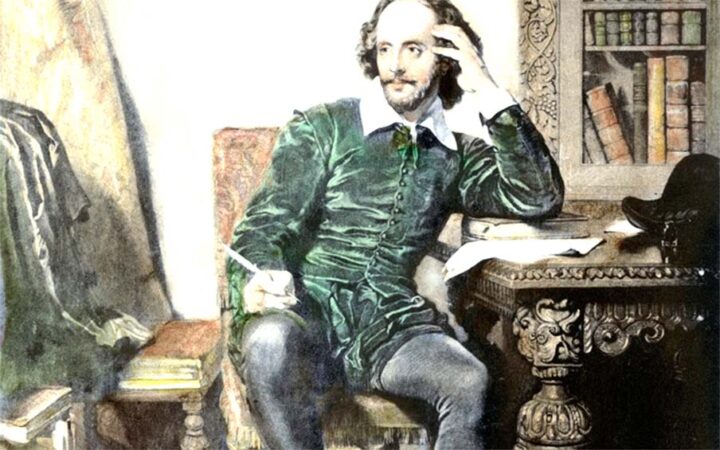S hakespeare was a famous writer. He wrote many good and winning plays. He created many attractive plays. When I was in 10th standard, I had to study two English textbooks. I like them and keep them in my drawers. One is “Seven Inventors”, and another book is “Six Tales” by Shakespeare. From Seven Inventors, we learnt about Thomas Edison, Charles Goodyear, the Wright brothers and other inventors. For their inventions, we can conveniently use many usable things. Six tales from Shakespeare contained “Julius Ceasar”, “King Lear and his three daughters”, and other exciting stories. Julius Ceasar passed away for his faithful friend “Brutus”, and his wife Cleopatra was suicide by biting a cobra. Cleopatra’s film was famous, and the audience loved it so much, and the cinema hall was crowded. My father also liked it, and he watched several times with me. This film indicates that no one trusts it. Brutus betrayed his lovely friend Julius Ceasar. We got many lessons from King Lear and his three daughters. King Lear asked his daughters how much they loved him. The elder two sisters replied they loved more than their lives. The youngest daughter replied she loved him as much as she could. The King angried his youngest daughter and drew out from the palace. But when the King was old, only the youngest daughter looked after his father. These tales also gave good lessons to the audience.
Shakespeare passed away over 400 years ago, yet his writing remains as influential as ever. An English professor and two actors explained why his work is so profile. It has been translated into more than 80 languages, including Klingon, a constructed language that first appeared in Star Trek. More recently, it drew massive audiences to the Pop-up Globe theatres in Auckland, Melbourne and Sydney.
So, why do we still care so much about the language from the “Bard of Abon”? Although William Shakespeare was a playwright for not much more than 20 years, he is still considered by many to be the greatest dramatist of all time.
The most famous writer who ever lived
“It seems contradictory for a world her hurtling headlong into an increasingly grim future to embrace preservation of any kind,” says Tom Bishop’ professor of English and drama at the University of Auckland and author of Shakespeare and the Theatre of Wonder. “Yet, Shakespeare’s prestige had never been higher or more widely invested in. His floating head with its balding pate is probably better known globally than that of any other artist of the past.
“In part, this fame is merely contingent, he explains”. “If the dominant world power of the age of colonial settlement had been Spain, as it nearly was, we would now be reading and recognizing Calderon or if it had been China, J, Junxiang”. We should not underestimate this extent to which Shakespeare’s contemporary dominance is the product of circumstances that have little to do with his actual work”.
Still, Shakespeare’s language is an intrinsic reason for his position.
“The modern Anglophone world has embraced its intensity, its dynamism and its express pungency,” says Professor Bishop.
Pop-up Globe is the world’s first full-scale temporary working replica of one of the greatest theatres in history, the second Globe, the theatre Shakespeare and his company built in 1614 after the first Globe burned down. The Pop-up Globe host Shakespeare festivals in Australia and New Zealand. The Merchant of Venice performed in front of Kiwi and Australian audiences.
Engaging the Emotions
It’s the raw emotion that makes Shakespeare’s language so engaging to Albert Walker, 27, who acted in the Pop-up Globe in Auckland.
“No writer is as good at finding the core themes of human existence and exploring them in great, simple storylines,” says Walker. “I think the only barrier is the language, which is often misunderstood and can become something to be feared, especially during high school, where, to me, it was taught in a stale and torturous way.
“I think Shakespeare is as relevant now as he ever was and ever will be. His stories deal with universal themes that transcend time. Whether it’s the devastating, conflicting loss Hamlet suffers or the intense, forbidden love that our famous lovers Romeo and Juliet go through, Shakespeare’s themes relate to people of all generations.
Universal Themes and Emotional Truth
Royal Academy of Dramatic Arts (AADA) trained New Zealand actor Lisa Harrow, 75, has spent many years performing with the Royal Shakespeare Company. Harrow has attained much acclaim in both theatre and film and has acted with Dame Judy Dench, David Suchet Pierce Brosnan, Peter O’ Tootle and Nigel Havers. At the Pop-up Globe in Auckland, she performed as Prospero in the Tempest.
“I think for an actor there’s nothing more thrilling than standing on a stage and engaging fully in the fibre of your being-mental, as well as physical with some of the things Shakespeare wants us to say,” says Harrow.
“It just vibrates through your body. In his plays, there are some heroic characters, but most of them have feet or clay. There are some great leaders, but most of them fail. What he’s able to do is be honest and fearless about what makes us tick. And exploring emotion is what makes us want to act.
I’ve never really studied Shakespeare. I’ve never done a course or read literary criticism because, for me, it’s never been about that. It’s about emotional thought. It’s about what’s inside the consonants and vowels that he puts on the page. It’s the feeling of the power of his language and the clarity and depth and perception with which he expresses what it’s like to be human with at our foibles,” she says.
Shakespeare’s Appeal is Worldwide
Bard’s work has made its mark around the globe because of its enduring language and themes. “I’ve heard of a project in the US where they take military veterans with post-traumatic stress disorder and work with them on Shakespeare plays in which soldiers and military readers experience war and brutality’ deceit and betrayal, victory and remorse,” says actress Lisa Harrow.
Shakespeare with Veterans is a free weekly conversation and acting ensemble based in Kentucky for military service personnel. Veterans of the US Army, Air Force, Navy and Marine Corps are finding confidence and comfort in Shakespeare’s language despite never having acted before.
The group discusses and tells stories about their lives, helping with the healing process and performing snippets of Shakespeare for other veterans and civilians.
“People who have never encountered a Shakespeare play in their lives find his work is giving them a way of getting to the grief that has been trapped inside them,” says Harrow.
“There can be no greater argument for Shakespeare’s continuing relevance than the power to heal some who is so destroyed by his or her experience of the brutality of war, and to help, then find their humanity again, and therefore find themselves”.
Shakespeare in short
Although his official birthdate is not recorded, in church records, Shakespeare was baptized on 26 April 1564. In Shakespeare’s time, it was traditional for baptisms to take place three days after birth.
The third child of a leather merchant and later bailiff, John Shakespeare, who landed heiress Mary Andrey William, was born in Stratford-upon-Avan during the reign of Queen Elizabeth.
He wrote 37 recorded plays from 1590 to 1613, and experts estimate Shakespeare passed away on his 52nd birthday, 23 April 1616. Amazingly, the Bard is considered a late bloomer and was once called an ‘upstart crow’ by a fellow playwright, Robert Greene.
In fact, his full literary genius wasn’t recognized until the 19th century.
Shakespeare’s birth is located in Henley Street Stratford upon Avon, England.
By Judy Wilford
Ref – Ingenio, the alumni magazine of the University of Auckland











